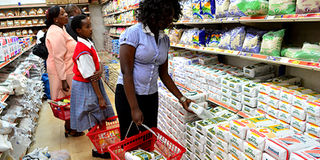MPs threaten to censure Githae over ‘punitive’ Bill

Shoppers in a supermarket. Prices of maize flour, bread, wheat flour, milk and other basic commodities will shoot up by 16 per cent, if MPs approve plans to impose a tax on them. Photo/FILE
What you need to know:
- VAT to be levied on infant formula, fertilizer and books
Prices of maize flour, bread, wheat flour, milk and other basic commodities will shoot up by 16 per cent, if MPs approve plans to impose a tax on them.
Also lined up for additional taxation are agricultural inputs, which could also push up food prices even further.
Kenyans have been suffering high cost of living, which has eased a little due to the fall in the cost of fuel.
Value Added Tax on staple foods, agricultural inputs and other critical items such as exercise books, has been suspended for years.
Finance Minister Njeru Githae is proposing to remove the exemptions in the Value Added Tax Bill 2012.
The tax measure comes only a few weeks after the imposition of tax on rental income, which landlords are likely to pass on to tenants, despite a government directive that they should not.
If MPs pass the Bill, then, according to the Nation’s calculations, the price of bread will rise by Sh6. Maize flour will rise by as much as Sh19. A two-kilo packet today sells for between Sh116 and Sh130.
Other prices likely to go up if the Bill is passed are the prices of fertilizer, seeds, insecticides, pesticides, sanitary towels and tampons, exercise books, mosquito nets and locally assembled water-pumps.
Others are infant formula, computer software, medical dressing and plaster, writing or drawing chalk, newspapers, journals and periodicals, cinematographic cameras and projectors among others.
On Monday, a section of MPs raised the red flag over the Bill, saying, if adopted, these provisions would be punitive to Kenyans.
The MPs, who included Aden Duale (Dujis), Charles Kilonzo (Yatta) and Fred Kapondi (Mt Elgon), have threatened to file a motion of no confidence in Mr Githae if he does not withdraw the controversial Bill for further consultation.
Mr Duale said increasing VAT on the essential commodities could trigger inflation. “We are against some of these punitive proposals from Treasury, which have the potential to fuel food riots in the country and reduce the economic gains that have been recorded over the years.
“By introducing a 16 per cent VAT on commodities which had formerly been zero rated, the implications will be grave — their cost to the poor will skyrocket due to cascading effect in the chain of production,” he said.
The proposed tax will raise the cost of production in the economy, making it less attractive to investors, Mr Duale argued.
Capital projects such as Konza City, Lamu Port and others under the Public Private Partnerships, he said, will be costly and unattractive to investors.
“We are asking the Finance Minister to withdraw the Bill to facilitate more consultation. It should not be brought to Parliament in this state,” he said.
Mr Kilonzo claimed the Treasury was being pushed by the International Monetary Fund and World Bank to impose the taxes.
“What kind of government, which has all along been saying it is pro-poor, comes up with such a Bill? We are asking President Kibaki to intervene. We in Parliament will not accept it,” he said.
Milk processors have already warned that the prices of dairy products will rise once the VAT Bill is enacted.
According to Dr Kipkirui Lang’at, the Kenya Cooperatives Creameries managing director, passing the Bill will have a “devastating effect” on the dairy industry in the long term.
“It will have a major implication on our operations as people will now move away from processed to unprocessed milk. This is because the processed milk will be too expensive for them,” Mr Lang’at told the Nation on Monday.
Consumer products
“The VAT will also be charged on the equipment that is used to process the consumer products. Milk processors will no doubt pass this cost to the consumer. Dairy farmers are not happy with this proposal,” he said.
Players in the dairy industry said they would issue a comprehensive statement on the matter later in the week.
Mr Nduati Kariuki, the chairman of Kenya National Federation of Agricultural Producers, said the Bill, if implemented in its current form, directly threatens food security and will be bad for stability.
“It will be only a matter of time before the country starts experiencing food riots,” he wrote in the Nation recently.
Coming at a time when the sector is reeling under the twin challenges of high input prices which have cut production, and high output prices, which manifest themselves in food insecurity, poverty and lack of employment, the Bill, he said, will harm agriculture.
Mr Kariuki says the removal of fertilisers from the list of zero-rated goods will lead to further increase in prices.
“This will not only lead to an increase in the price of agricultural inputs, but also translate into increased cost of production beyond the means of largely poor, rural-based, subsistence farmers, thereby deepening poverty levels,” he said.




